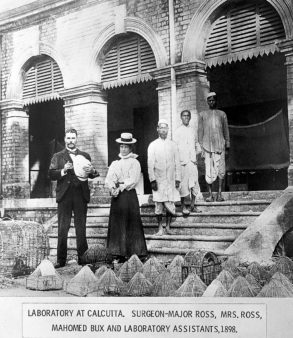- by Ronnie Moore
World Mosquito Day 2017: celebrate the findings of Ronald Ross
What is World Mosquito Day?
In the year of 1897, a British doctor named, Ronald Ross found that it was the female mosquitoes (of the Anopheles genus) that were responsible for transmitting the malarial parasite. In a nutshell, his discovery ultimately led to smarter ways to prevent mosquito-borne diseases like malaria, dengue, and Zika. Ross was awarded the Nobel Prize in Physiology or Medicine for his findings in 1902, and his discovery is celebrated every year on August 20, World Mosquito Day.

Sir Ronald Ross on steps of the laboratory in Calcutta, 1898. Image via Wellcome CC
In recent times, we have seen rising temperatures, urbanization, and globalization spreading dengue and other mosquito-borne diseases introduced to new parts of the world. Despite the historic achievements of Dr. Ross, it is only recently that we’ve seen noticeable changes in how we fight the mosquitoes that spread vector disease.
World Mosquito Day 2017: three reasons for optimism
Friendly mosquitoes: Releasing more mosquitoes into communities to fight diseases like dengue may sound unorthodox, but results from Oxitec’s ‘friendly mosquitoes‘ and success with Eliminate Dengue’s Wolbachia bacteria both show promising results in safely controlling mosquito populations.
Vaccines: The world’s first dengue vaccine arrived last year and is now registered in eighteen countries in Asia and Latin America. The vaccine is also recommended by the WHO in areas where the disease is endemic. A working malaria vaccine is closer than ever, and the search for a Zika vaccine is also making progress.
Technology: Microsoft has responded to the global health threats that mosquitoes pose by introducing its Project Premonition. Microsoft Research stated in a blog post, “Project Premonition could eventually allow health officials to get a jump start on preventing outbreaks of a disease like dengue fever or avian flu before it occurs, whether or not it is a disease spread by mosquitoes.”
Populations of more than 100 countries are now at risk of dengue and Break Dengue recognizes the need for more effective disease surveillance. With the help of our partners, in 2016 we introduced Dengue Track to help fill this gap.
Through a userfriendly online chat system, users (Dengue Trackers) access the tool which builds an up-to-date, crowd-sourced map based on recent reports. The system also provides tips on how to reduce the risk of infection. Anyone can access free toolkits and quickly submit details of dengue outbreaks in their area. Dengue Track is a novel approach to disease mapping which could also track diseases like Zika or Malaria in the future. Give Dengue Track a try!
Dengue fever is a potentially-fatal disease that now affects over 390 million people every year, and while the exact number is not known, the economic burden of dengue alone is estimated at around $8.89 billion USD. Currently, around 40% of the global population lives in highrisk areas of dengue infection.
There are plenty of challenges on the horizon but, given the progress, science has made in recent years we see a reason for optimism. After all, the rate at which technology moves today, we may be celebrating World Mosquito Day in the near future by remembering all the havoc mosquitoes used to cause.
—

